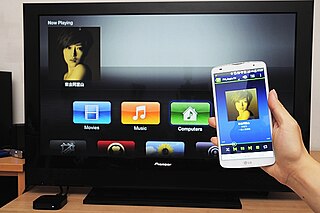EPP or Epp may refer to:
EPP or Epp may refer to:

Bluetooth is a short-range wireless technology standard that is used for exchanging data between fixed and mobile devices over short distances and building personal area networks (PANs). In the most widely used mode, transmission power is limited to 2.5 milliwatts, giving it a very short range of up to 10 metres (33 ft). It employs UHF radio waves in the ISM bands, from 2.402 GHz to 2.48 GHz. It is mainly used as an alternative to wired connections to exchange files between nearby portable devices and connect cell phones and music players with wireless headphones.

The European People's Party Group is a political group of the European Parliament consisting of deputies (MEPs) from the member parties of the European People's Party (EPP). Sometimes it also includes independent MEPs and/or deputies from unaffiliated national parties. The EPP Group comprises politicians of Christian democratic, conservative and liberal-conservative orientation.
The European Democratic Group, more commonly known as European Democrats, was a conservative political group that operated in the European Parliament between 1979 and 1992. At its height in July 1979, it had 63 MEPs.

Interoperability is a characteristic of a product or system to work with other products or systems. While the term was initially defined for information technology or systems engineering services to allow for information exchange, a broader definition takes into account social, political, and organizational factors that impact system-to-system performance.
An open standard is a standard that is openly accessible and usable by anyone. It is also a common prerequisite that open standards use an open license that provides for extensibility. Typically, anybody can participate in their development due to their inherently open nature. There is no single definition, and interpretations vary with usage. Examples of open standards include the GSM, 4G, and 5G standards that allow most modern mobile phones to work world-wide.
PPE may refer to:
SPP or spp may refer to:

Profibus is a standard for fieldbus communication in automation technology and was first promoted in 1989 by BMBF and then used by Siemens. It should not be confused with the Profinet standard for Industrial Ethernet. Profibus is openly published as type 3 of IEC 61158/61784-1.

The European People's Party (EPP) is a European political party with Christian democratic, liberal-conservative, and conservative member parties. A transnational organisation, it is composed of other political parties. Founded by primarily Christian-democratic parties in 1976, it has since broadened its membership to include liberal-conservative parties and parties with other centre-right political perspectives. On 31 May 2022, the party elected as its President Manfred Weber, who was also EPP's Spitzenkandidat in 2019.

The CDS – People's Party is a conservative and Christian democratic political party in Portugal. It is characterized as being between the centre-right and right-wing of the political spectrum. In voting ballots, the party's name appears only as the People's Party, with the abbreviation CDS–PP unchanged.

IEEE 1284, also known as the Centronics port, is a standard that defines bi-directional parallel communications between computers and other devices. It was originally developed in the 1970s by Centronics before its IEEE standardization.

The political groups of the European Parliament are the officially recognised parliamentary groups consisting of legislators of aligned ideologies in the European Parliament.
WS-Management is a DMTF open standard defining a SOAP-based protocol for the management of servers, devices, applications and various Web services. WS-Management provides a common way for systems to access and exchange management information across the IT infrastructure.
App, Apps or APP may refer to:
In computing, serial presence detect (SPD) is a standardized way to automatically access information about a memory module. Earlier 72-pin SIMMs included five pins that provided five bits of parallel presence detect (PPD) data, but the 168-pin DIMM standard changed to a serial presence detect to encode more information.

The Liberal Alliance is a classical liberal and right-libertarian political party in Denmark. The party is a component of the centre-right bloc in Danish politics. The party's platform is based upon economic liberalism, promotion of tax cuts and reduction of welfare programmes, and a critical, oppositional stance towards European integration.
The European Conservative Group was a conservative political group that operated in the European Parliament between 1973 and 1979. At its height in July 1979, it had 63 MEPs.
Direct Anonymous Attestation (DAA) is a cryptographic primitive which enables remote authentication of a trusted computer whilst preserving privacy of the platform's user. The protocol has been adopted by the Trusted Computing Group (TCG) in the latest version of its Trusted Platform Module (TPM) specification to address privacy concerns. ISO/IEC 20008 specifies DAA, as well, and Intel's Enhanced Privacy ID (EPID) 2.0 implementation for microprocessors is available for licensing RAND-Z along with an open source SDK.
Bluetooth Low Energy is a wireless personal area network technology designed and marketed by the Bluetooth Special Interest Group aimed at novel applications in the healthcare, fitness, beacons, security, and home entertainment industries. Compared to Classic Bluetooth, Bluetooth Low Energy is intended to provide considerably reduced power consumption and cost while maintaining a similar communication range.